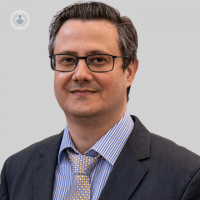Ask an expert: What is chronic obstructive pulmonary disease?
Written by:Chronic obstructive pulmonary disease (COPD) is a progressive condition of the airways in which respiratory symptoms, like wheezing, breathlessness or cough, become worse over time. In this informative guide to the condition, highly respected consultant in pulmonology and respiratory medicine, Dr Ricardo José, details the most common symptoms and principal causes of COPD. The leading specialist also sheds light on the various forms of treatment and how they benefit different patients.

What is chronic obstructive pulmonary disease?
Chronic obstructive pulmonary disease (COPD) is a condition where the airways of the lungs become progressively narrower or more blocked over time, reducing the flow of air. The most common forms of the condition are emphysema and chronic bronchitis, which differ from asthma, as the reduction of airflow worsens over time and is irreversible.
In patients with emphysema, damage to the alveoli (air sacs) reduces the available vital surface required for the transfer of oxygen from the lungs to the blood. Equally, this affects the capacity of the lungs to receive carbon dioxide back from the blood. Chronic bronchitis differs in that inflammation of the airways (bronchi) causes the narrowing and production of mucus which reduces airflow.
What are the symptoms of COPD?
The most common symptoms of COPD are:
- a persistent cough, possibly with phlegm
- being short of breath
- wheezing
- chest infections that recur over time
In most cases, the symptoms of COPD develop slowly over time and progressively become more severe but can worsen suddenly during an exacerbation that may be triggered by infection.
What causes COPD?
Smoking as well as long-term exposure to and inhalation of chemicals or smoke from biomass fuels are the principal causes of COPD. Some people are more prone to developing the condition than others due to family genetics.
How is COPD diagnosed?
The history of the symptoms and physical examination may suggest chronic obstructive pulmonary disease. If COPD is suspected, lung function tests are performed to help establish the diagnosis. The lung function tests can assess airflow (i.e. how much air can be exhaled rapidly from the lung) and lung capacity. A chest x-ray may show features of hyperinflation and a CT scan may show evidence of emphysema and air trapping.
Can COPD be cured?
Unfortunately, there isn’t a cure for COPD and the effects of the condition on the airways within the lungs. However, early diagnosis and effective treatment can help to slow any worsening of symptoms and the progression of the disease itself.
How is COPD treated?
There are a number of approaches to treatment of chronic obstructive pulmonary disease which may vary from patient to patient. For all patients suffering from COPD, however, an annual flu vaccination is recommended and the pneumococcal vaccination should be given at least once in the person’s life. Those who smoke are strongly advised to stop and those with breathlessness are encouraged to enrol in a pulmonary rehabilitation program.
Inhalers, which contain anti-inflammatory agents and bronchodilators, are commonly used to treat and manage the condition’s symptoms. This form of therapy, which sometimes includes low dose inhaled corticosteroids, helps to relieve wheezing and breathlessness and also helps to reduce exacerbations of the condition.
Should patients experience an exacerbation or sudden worsening of their symptoms, they may be prescribed additional treatment, such as an oral anti-inflammatory or antibiotics if bacterial infections or recurrent chest infections are a contributing factor. Infections with non-tuberculous mycobacteria or fungi can also occur in people with COPD and should be looked for.
Patients who produce a large amount of phlegm or are not able to effectively expectorate it (cough it up) may also require help to clear their airways. Chest physiotherapy can be very effective in clearing the airways of excess phlegm and can also benefit patients requiring breathing pattern re-education or better management of breathlessness through pulmonary rehabilitation programmes.
Oxygen treatment may also be necessary for some patients to allow them to go about their daily routine, particularly as the condition develops over time. In severe cases, this helps to reduce the negative impact that low oxygen levels can have on the heart. For those with respiratory failure the need for non-invasive mechanical ventilation may arise.
In select groups of COPD patients, lung volume reduction interventions through surgery or endoscopic techniques may be help reduce breathlessness associated with hyperinflation.
If you are concerned about symptoms of COPD and wish to schedule a consultation with Dr José, you can do so by visiting his Top Doctors profile.


